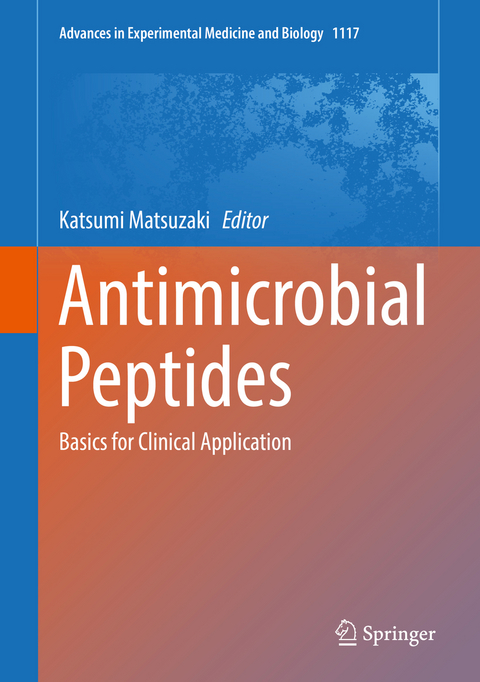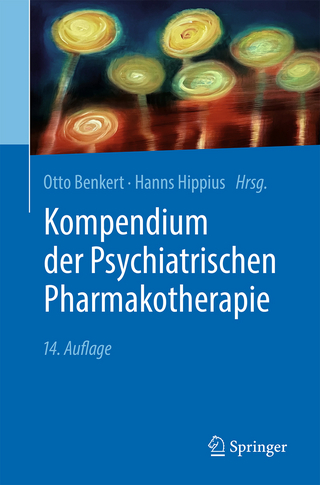
Antimicrobial Peptides
Springer Verlag, Singapore
978-981-13-3587-7 (ISBN)
Katsumi Matsuzaki is a Professor at the Graduate School of Pharmaceutical Sciences, Kyoto University, where he also completed his PhD in Biophysical Chemistry. Dr. Matsuzaki has authored more than 100 publications, which have been cited more than 10000 times. In addition to serving as an editor for Biochimica et Biophysica Acta-Biomembranes, Journal of Peptide Science, and European Biophysics Journal, he is a member of the Biophysical Society (USA), The Pharmaceutical Society Japan, The Japanese Peptide Society, and The Biophysical Society of Japan. He was awarded The Japanese Peptide Society Award for Young Scientists, The Pharmaceutical Society Japan Award for Young Scientists, and the Erwin von Bälz Prize. His primary research interest is in membrane biophysics, including peptide–membrane interactions and in-cell biophysics.
Part 1. Introduction.- Chapter 1. Antimicrobial peptides of multicellular organisms: My perspective.- Part 2. Mechanisms of Antimicrobial Action.- Chapter 2. Membrane permeabilization mechanisms.- Chapter 3. Elementary processes and mechanisms of interactions of antimicrobial peptides with membranes --- single GUV studies ----.- Chapter 4. The mechanisms of action of cationic antimicrobial peptides refined by novel concepts from biophysical investigations.- Chapter 5. Anionic lipid clustering model.- Chapter 6. Intracellular antimicrobial peptides targeting the protein synthesis machinery.- Part 3. Other activities of AMPs.- Chapter 7. Antimicrobial and cell-penetrating peptides: How to understand two distinct functions despite similar physicochemical properties.- Chapter 8. Synthetic anti-lipopolysaccharide peptides (SALP) as effective inhibitors of pathogen-associated molecular patterns (PAMPs).- Chapter 9. Anti-cancer activities of natural and synthetic peptides.- Chapter 10. Antimicrobial host defence peptides: Immunomodulatory functions and translational prospects.- Part 4. Towards Clinical Applications.- Chapter 11. Activity and selectivity of antimicrobial peptides: A complex interplay of multiple equilibria.- Chapter 12. Design of antimicrobial peptides: Progress made with human cathelicidin LL-37.- Chapter 13. Application of synthetic molecular evolution to the discovery of antimicrobial peptides.- Chapter 14. AMPs as anti-biofilm agents for human therapy and prophylaxis.- Chapter 15. Clinical application of AMPs.
| Erscheinungsdatum | 25.04.2019 |
|---|---|
| Reihe/Serie | Advances in Experimental Medicine and Biology ; 1117 |
| Zusatzinfo | 55 Illustrations, color; 18 Illustrations, black and white; VIII, 304 p. 73 illus., 55 illus. in color. |
| Verlagsort | Singapore |
| Sprache | englisch |
| Maße | 178 x 254 mm |
| Themenwelt | Medizin / Pharmazie ► Medizinische Fachgebiete ► Pharmakologie / Pharmakotherapie |
| Medizin / Pharmazie ► Pharmazie | |
| Naturwissenschaften ► Biologie ► Biochemie | |
| Naturwissenschaften ► Physik / Astronomie ► Angewandte Physik | |
| Schlagworte | Anticancer agent • Antisepsis agent • clinical application • Mechanism of Action • Peptide translocation |
| ISBN-10 | 981-13-3587-7 / 9811335877 |
| ISBN-13 | 978-981-13-3587-7 / 9789811335877 |
| Zustand | Neuware |
| Haben Sie eine Frage zum Produkt? |
aus dem Bereich


